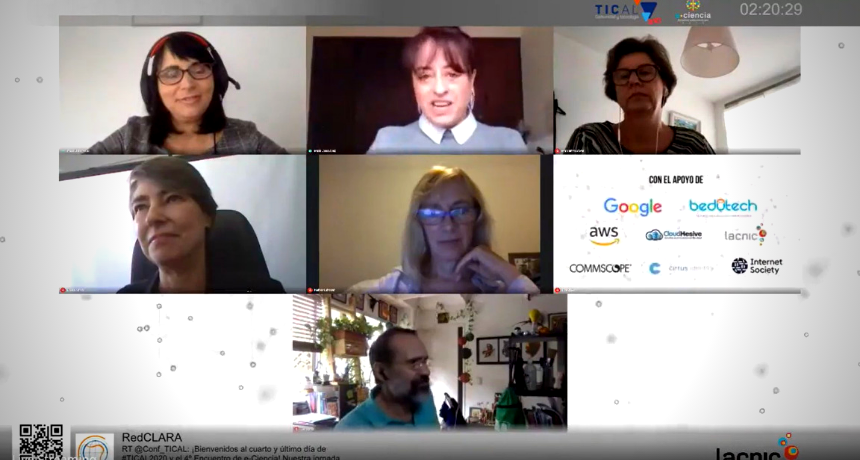Instead of conversations in the hallways, we had tweets. In the place of group photos, screenshots. And instead of farewell hugs, the immense desire to meet in person in 2021. The 10th edition of the TICAL Conference and the 4th of the Latin American e-Science Meeting came to an end on this Thursday 3rd. The event was held online since Monday, August 31, on the site tical2020.redclara.net, given the difficulties imposed by the COVID-19 pandemic.
With almost 2000 registered, which were divided between plenary sessions, virtual stands, parallel sessions and workshops, on a platform specially developed for the occasion, TICAL and "e-Science" discussed the topic "The Digital Route of the Intelligent University" from different perspectives, such as intercontinental collaboration, artificial intelligence and digital transformation. In the closing session, it was time to do it from the point of view of the use and management of open data and science. And with the strength of women.
The discussion table was completely female, with the presence of Bianca Amaro (president of LA Referencia and Coordinator of the Brazilian Open Science Program of the Brazilian Institute of Information in Science and Technology - IBICT), Cathrin Stöver (Communications Manager of GÉANT and Vice President of the Executive Board of the European Open Science Cloud - EOSC), María Esther Vidal (Head of the Research Group on Scientific Data Management Leibniz Information Center for Science and Technology University Library) and Kathleen Shearer (CEO of the Confederation of Open Access Repositories - COAR). “It is a great honor and pleasure to share the table with these women, since moments like this are very difficult to see. We thank TICAL for promoting this space”, celebrated Stöver.
The first talk was given by Bianca Amaro, who explained the importance of open science for research. “It is more important than we think. Open Science speeds up and increases the visibility of research, eliminates data loss, saves resources, and opens up many possibilities for cooperation. We have to keep working on this”, she declared. Cathrin Stöver explained that the great challenge in relation to the adoption of Open Science is not technological. “The subject is more cultural than anything else. The conditions are in place, but it is necessary to change some paradigms. Hopefully in 10 years we will only talk about ‘Science’, because there is no other way to do it but openly”, said the GEÁNT CCO, who also highlighted the importance of interdisciplinary research.
The session continued with the participation of María Esther Vidal and Kathleen Shearer. For the CEO of COAR, who presented the work of the international confederation of repositories, the COVID pandemic, despite being a tragic event, marked an important moment for Open Science. Vidal, in turn, showed the work done at the Leibniz Information Center in terms of data management and said that the doors of collaboration with Latin America are open.
Collaboration with Africa
After the closing of the plenary session, the advanced networks of Latin America (RedCLARA) and Eastern and Southern Africa (UbuntuNet) signed a cooperation agreement that aims to strengthen relations between the two organizations and the creation of joint projects. The networks were represented by their CEOs Luis Eliécer Cadenas and Matthews Mtumbuka. The possibilities of connection and cooperation between the two continents were made possible by the BELLA project. "If someone had told me years ago that we would have a connection between Latin America and Africa, I would not have believed. What we are doing today is a great achievement," celebrated the CEO of the Brazilian network RNP, Nelson Simões, who was also present at the agreement ceremony. A perfect closing for a more than special edition of TICAL and e-Science. "Making TICAL virtually was a great challenge. We had difficulties, but the desire to continue strengthening the Latin American and global NREN community was greater. I am proud. They were incredible days, with relevant topics and highly qualified exhibitors. I think we should continue discussing the possibilities of virtual and hybrid models", Cadenas concluded.
For those who could not watch the Conference, the recordings of the plenary, parallel sessions and the workshops will be available on the RedCLARA channel on YouTube after the end of the Conference. Visit and register on RedCLARA-TV. The TICAL2020 Conference and the 4th Latin American Meeting of e-Science were organized by RedCLARA and the BELLA Project, with the support of the national research and education networks of Latin America and the sponsorship of Google, Bedu.Tech, Amazon Web Services, CloudHesive Latam , Commscope, LACNIC, Internet Society and Cirrus Identity.
For more information on TICAL2020, please visit https://tical2020.redclara.net







